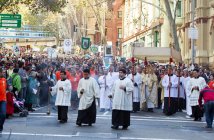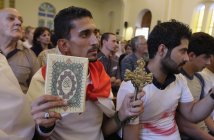 News from around the Catholic world for the week ending 1 August.
News from around the Catholic world for the week ending 1 August.
DOWNLOAD (Right click to save) (10:40 mins)
• The Vatican marks first World Day Against Trafficking in Persons
• Chinese Christians injured in protests against demolition of churches
• Dominican theologians release report on pastoral-care of divorced and remarried Catholics in lead up to Synod
• Catholic Prison Ministry scrapped in Brisbane
• Worldwide protests show support for the plight of Christians in Iraq.
TRANSCRIPT
BOBBIE: The Vatican has this week marked the first World Day against Trafficking in Persons by hosting a videoconference with America’s top official on monitoring human trafficking.
The Vatican’s Pontifical Academy of Sciences hosted the Conference, along with the U.S embassy to the Holy See and the ecumenical Global Freedom Network. Ambassador Luis CdeBaca, attending the conference from Washington, spoke on the findings of the recent U.S. report on trafficking in persons. Vatican radio has that report.
VATICAN RADIO: Tracking progress being made in 188 countries around the world, the report focuses on a triple paradigm of ‘prevention, protection and prosecution’. It’s filled with personal stories about men, women and children who’ve escaped from slavery and are now helping in the fight against the traffickers. Talking to journalists about the millions of people still falling victim to this crime, Ambassador CdeBaca said there has been an important shift in the way trafficking is being defined:
AMBASSADOR CDEBACA: “Trafficking was defined as moving people across international borders, so that allowed the exemption from their calculations of people for instance who are working in debt bondage in the same village that their parents had been in debt bondage and their grandparents had been in debt bondage. It defined out hereditary slavery in Mauritania, Mali and other parts of West Africa. And so I think what we’ve seen is, yes the problem is probably increasing because of globalisation, but our ability to recognise it and to identify it is increasing at a much greater pace.
PHILIPPA HITCHENS: But does that mean we’re making progress against the trafficking gangs? Certainly the Ambassador listed numerous countries – from the UK to Chile, Sudan to Haiti – that have introduced new anti-trafficking legislation. But he said there is still not enough political will to tackle the more hidden forms of this widespread phenomenon.
AMBASSADOR CDEBACA: What we’ve seen around the world is that governments will always try to reclassify things so they are not defined as human trafficking, to protect their fishing industry, to protect their palm oil industry, to protect their charcoal industry, to protect their ability to bring in nannies or people to come and build their stadiums for upcoming sporting events.
PHILIPPA HITCHENS: Ambassador CdeBaca stressed the important role the Church has played in defining trafficking as a crime against humanity, pushing it higher up the public agenda. But he said it’s vital to work closer together with all those dealing with the problem to find effective prevention strategies.
BOBBIE: Pope Francis demonstrated his commitment to end human trafficking earlier this year when he launched The Global Freedom Network in partnership with Anglican and Muslim Leaders.
World Day against Trafficking is an initiative of the United Nations aiming to raise awareness of the millions of people trafficked each year and sold into sex slavery or forced labour.
More on that story via news.va
—
Dozens of Christians have been beaten during a rally to protect Kau Yan Church, in Zhejiang, China, early last week.
The Kau Yan Church building was to be demolished that day under orders by the Chinese Government. Another 130 churches have been marked for the same fate.
Police and urban management attempted to control the situation by inflicting violence upon the crowd of 1000 Christians, causing dozens to be hospitalised. Images of the incident from social media sites show victims suffering heavy blood loss and injuries to the head.
The incident follows that of April 4th, where Sanjiang Church, Wenzhou, was defended by thousands of Chinese Christians after the Chinese Communist party threatened to demolish it. This church has since been destroyed.
More than sixty churches in Wenzhou alone have received a demolition notice within the past three months. The city has had more churches demolished than anywhere else across Mainland China.
These incidents are part of the Government’s wider effort to suppress the practice of religion and follows China’s campaign to outlaw private church gatherings, which took place in May this year. Under Chinese law, Christians are also restricted to worshipping one day a week, and preachers are required to avoid mention of politically sensitive topics.
More on that story at Wall Street Journal and Telegraph UK
– – –
A group of Dominican theologians have released an article on the pastoral care of divorced-and-remarried Catholics in the lead-up to October’s extraordinary Synod of Bishops.
The 30-page article published in Swiss journal Nova et Vetera is largely a response to proposals outlined by Cardinal Walter Kasper at the extraordinary Consistory of Cardinals in February this year.
Cardinal Kasper had suggested taking a less judicial path to the marriage annulment process and the admission of divorced-and-remarried Catholics to the reception of Holy Communion.
The article outlines the theological issues with Cardinal Kasper’s proposals, namely their direct contradiction of the teachings of popes, councils and Christ Himself. The article references Scripture, Church Fathers and various other texts to demonstrate Cardinal Kasper’s problematic approach to marriage, annulment, Holy Communion and the call to chastity.
The article states, “The Church’s teaching on marriage, divorce, human sexuality, and chastity can be hard to receive. Christ himself saw this when he proclaimed it. However, this truth brings with it an authentic message of freedom and hope: there is a way out of vice and sin. There is a way forward that leads to happiness and love.”
Download the full article (PDF)
—
The Queensland Department of Corrective Services has scrapped the Catholic Prison Ministry and the Prisoner’s Legal Service, claiming it found “no demonstrated need” for the services, Fairfax Media reported on Wednesday.
For about 20 years the advocacy groups have been visiting Queensland prisons speaking to prisoners about issues within the prisons which impact on the prisoners. The Catholic Prison Ministry has used the information gathered as part of its annual report to correction facilities.
A spokeswoman for Queensland Corrective Services said the State has a robust oversight framework to ensure appropriate levels of accountability and transparency across the correctional system.
“QCS understands the legitimate and long-standing interest that both the Catholic Prison Ministry and other similar organisations have with the corrections system,” the spokeswoman said.
“As such, the organisations have been advised that visiting arrangements with individual prisoners can continue,” she said.
Catholic Prison Ministry coordinator Dave Martin told community radio station 4ZZZ that the information gained informed their reports and the systematic issues raised.
—
International condemnation continues in response to the expulsion and persecution of Christians in Mosul, Iraq by Islamic State militants.
In the United Kingdom, National Director of Aid to the Church in Need Neville Kyrke-Smith has said that the British Government is partially responsible for the current situation in Iraq and the Middle East.
Mr Kyrke-Smith said, “The UK’s balanced approach to uprisings in the Middle East – supporting rebels as long as they are not too extreme – has blown up in our face.”
Meanwhile, Aid to the Church in Need Australia’s National Director Phillip Collignon has stated that the Catholic Church in the Iraq region is currently responding to the needs of the newly displaced Christians. Mr Collignon detailed the response in a recent interview with Cradio:
PHILLIP COLLIGNON: Now there’s also something like five to ten thousand… Christians who are fleeing to Kurdistan for refuge. And the Catholic Church there is setting up centres for these displaced Christians, and it’s been quite remarkable really.
Here we have the situation in Erbil where the Catholic Church is just scrambling to cater for the Christian population there building churches and also now catering for the Christians who have been evacuated there – and it’s going to be a headache for Archbishop Warda of Erbil as he tries to cater for those displaced Christians.
In Baghdad, protests have been held by both Christians and Muslims condemning the Islamic State expulsion. Protestors reportedly prayed in solidarity for peace in the region, holding signs, which stated “I am Iraqi, I am Christian.”
Similar protests were also seen in Western nations through the week, with demonstrations held by Christians and Muslims in London, Paris, Washington D.C. and The Hague.
Protests have also been planned in Sydney by Australia’s Coptic Community, to take place on Saturday in the Sydney CBD. The protest will demand a peacekeeping intervention in the Islamic State-controlled territory and humanitarian aid to the displaced.
More information on the protest can be found on the Australian Coptic Community website.
Music Credit: Waking Up by Dexter Britain.





